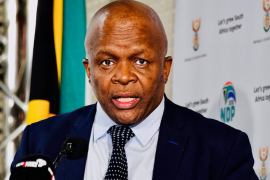 11 April 2022
11 April 2022
Minister in the Presidency, Mondli Gungubele, says a key issue commissioners appointed to the National Planning Commission (NPC) will be expected to address is the slow progress in the implementation of the National Development Plan (NDP) and to identify solutions to make sure that the country fast tracks its route to the NDP goals.
The Minister, who serves as chairperson of the NPC, was speaking during a first media briefing of the third NPC which was appointed in December last year. “One of the shortcomings that [the NPC] has identified…was the incapacity of the state to implement the proposals of the NDP. This often combined with poor leadership that pay lip-service to the NDP without understanding its goals has acted as an obstacle to implementation of developmental objectives.
“As government, we are clear that the greatest challenge has been around implementation and in the discussions held to date, this was my emphasis to guide the discussions,” Gungubele said.
The National Development Plan – which was adopted ten years ago – was created as an action plan for government to tackle several challenges facing the country including unemployment, poverty, inequality, safety and healthcare. “The NDP was designed to change the lives of all South Africans by taking a comprehensive approach where the reality of 2012 [would] become a different one by 2030. We must recognise that we have not met the goals as we intended 10 years ago, that is true.
“Recognising this is the first step to asking: how do we do things differently to change the trajectory that we are on. This is where [the commission] will assist us as we tackle this challenge where implementation of our plans has not met the targets,” he said.
NPC Deputy Chairperson, Professor Tinyiko Maluleke, said the third NPC begins its term at a precarious moment in our country’s history and the “tall order” it faces in bringing the country closer to what the NDP envisioned. “There is, of course, a reason why we are called the NPC…and not the National Implementation Commission. But if implementation is slow or non-existent, planning alone, is clearly insufficient. Given that ours is a tenure that is closest to the finish line of 2030, we cannot afford to be dismissive, smug or philosophical about implementation.
“We have to probe why it is, why it has been so hard to coordinate, to cohere, to cascade down, to streamline and pinpoint down the necessary catalytic interventions which will embed and institutionalise the NDP within the departmental, provincial and municipal plans,” he said.
Professor Maluleke said the NPC will also give attention to identifying catalytic areas for government to pursue. “Countries which have successfully achieved their national developmental goals and targets are those at the heart of whose plans are clear catalytic priorities around which the whole state machinery is mobilized.
“The third NPC will help to enhance the ability of the state to identify and pursue catalytic priorities which will expedite the attainment of NDP goals,” he said. According to Maluleke, another focus area for the NPC will be mobilizing the country’s support for the NDP and its goals.
“Although the NDP is a plan for the whole country, it has not been sufficiently adopted by all sectors at all times. As we mark its tenth anniversary in September, the NPC is urging all South Africans to rally behind the NDP to ensure its implementation and to call government to account on the basis of the promise contained in the NDP. “To that end, the NPC is committed to building partnerships broadly across society and to pursing engagements that should ensure active citizenry and strong leadership for development,” he said.
